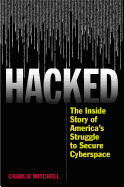
Every one of 16 critical infrastructures in the U.S. economy is susceptible to cyberattacks: agriculture, transportation, the power grid, even the pacemakers already implanted in patient's chests. And still, according to Washington, D.C., cybersecurity journalist Charlie Mitchell, "The effort to secure cyberspace, by government and industry, remains in the embryonic stages." The military, technology experts, business and government agree that the threats are clear, new attacks are discovered all the time and the tools for building defenses are at hand--why hasn't the federal government done more? In Hacked, his first book, Mitchell explains the conflicting interests and political struggles in the messy business of creating and implementing effective cybersecurity policy.
Most of the structures that need to be protected in the U.S. are privately owned. This sets up a tension between national security interests and concerns for personal freedoms, business operations and privacy. In 2008, as the Obama administration began to address the question of cybersecurity, many officials began to realize that "it was a mistake to view cybersecurity as a technical issue. It was about people, process and commitment."
Mitchell dives deep into the negotiations, innovations and failed initiatives of both government and industry. His descriptions of the most tortured legislative battles are straightforward and comprehensible. This is an accessible insiders' guide to a difficult subject that will interest anyone concerned about national cybersecurity. --Sara Catterall

